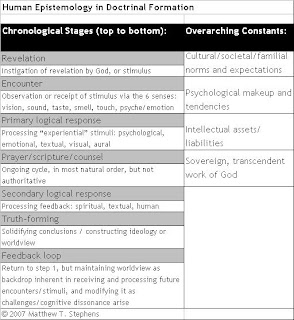On Divine Revelation and Human Epistemology
In response to my post on John Piper's recent CT article (below), The Coreman proposed a new term to define personal, divine revelation that is "outside" of scripture, but in accordance with, or parallel to, scripture: parabiblical revelation. This thought, riding on the coat-tails of a lesson he taught on a recent Sunday morning regarding our formulation of doctrine, inspired him to blog about the subject this past Wednesday. Included in his post was a diagram showing what he perceives to be the most spiritually mature/responsible process of arriving at doctrine. We "sparred" (to use his term) a bit about whether there is a mature and immature way to formulate doctrine, or a sacred and secular way of arriving at truth (epistemology). He and I both agree that the accuracy of our doctrine is very likely contingent upon our ability and efforts to make ourselves aware of the factors (internal and external) which influence our thought-processes and assumptions. I argued, however, that apart from these considerations, there is not a "right" and "wrong", "mature" and "immature" way to arrive at truth, only a human way, which is ubiquitous and inescapable. I have illustrated this "way" below. You may view his proposal here.

(Click image for larger view)
You philosophers and social constructionists out there, how accurate would you say this is? Am I missing some "environmental" influencers in the "Constants" list? Other thoughts?

(Click image for larger view)
You philosophers and social constructionists out there, how accurate would you say this is? Am I missing some "environmental" influencers in the "Constants" list? Other thoughts?
Comments
Post a Comment